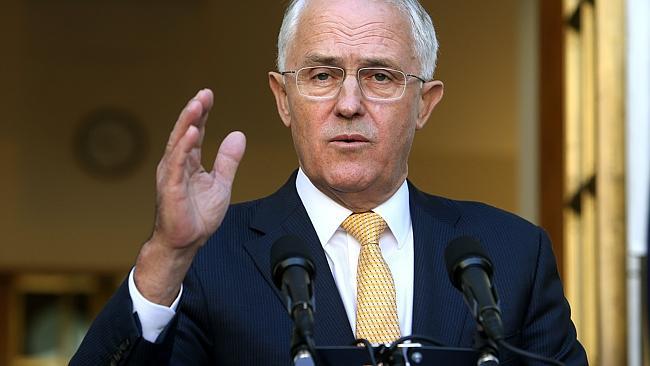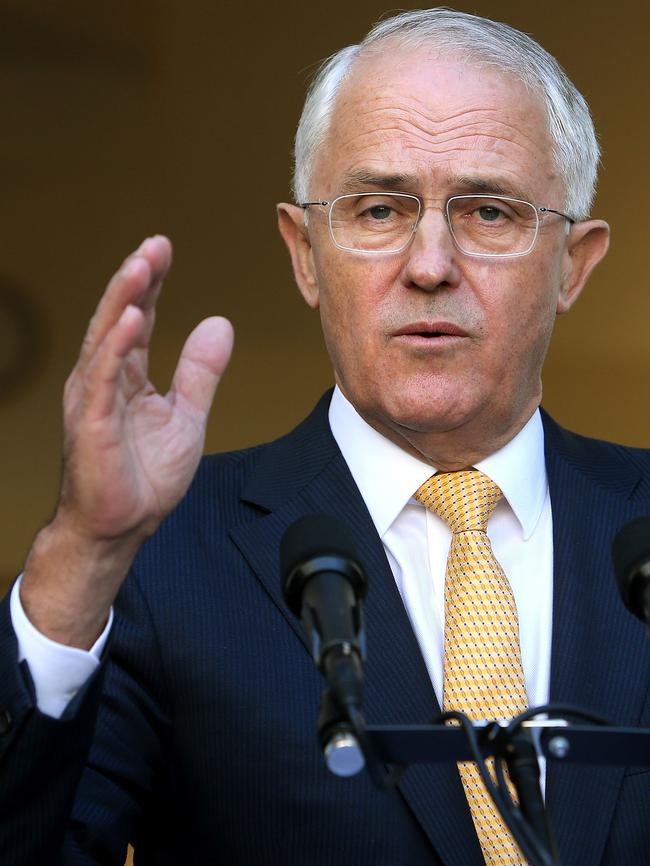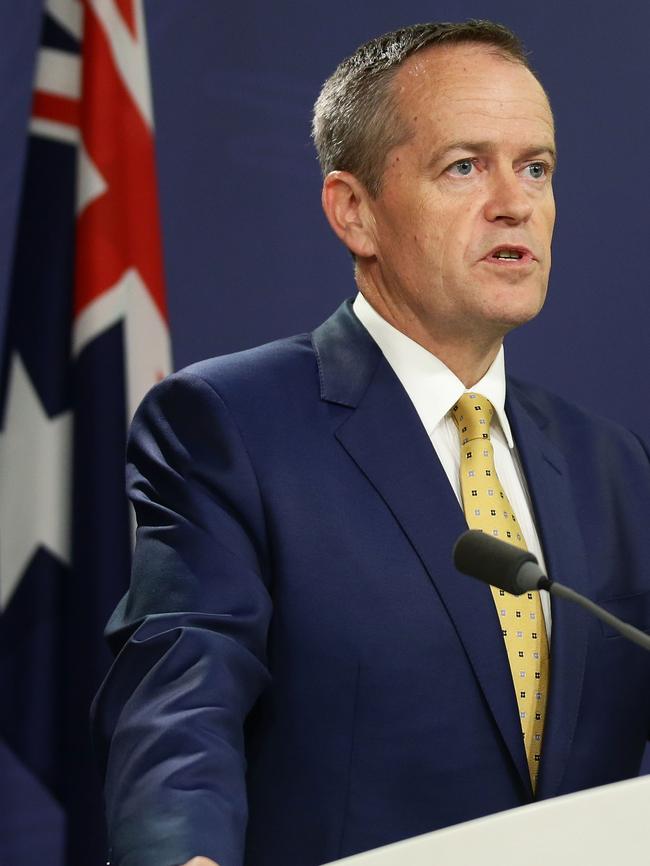Malcolm Turnbull threatens double dissolution election as he recalls Parliament
UPDATE: Malcolm Turnbull has rejected former Prime Minister Tony Abbott’s claim that the election will be fought on his record, as the way was cleared for a double dissolution. So what IS going on? We explain it all

News
Don't miss out on the headlines from News. Followed categories will be added to My News.
- Poll shows Pyne would struggle to keep seat
- No tax-cut trimmings for bare-bones Budget
- What does a double dissolution mean?
- How the seats could change: SA’s power shake-up
- Analysis: Turnbull had to throw down the gauntlet
UPDATE: TONY Abbott has taken a dig at Malcolm Turnbull’s push to bring on an early election, saying the Prime Minister is running on the “strong” record he achieved while in power - but Mr Turnbull says Mr Abbott is wrong.
Mr Abbott highlighted his government’s three free trade deals, efforts to stop asylum seeker boats and strong national security credentials.
“It’s very easy for me to campaign for the Turnbull Government because the Turnbull Government is running on the record of the Abbott Government, and that makes me a very enthusiastic supporter,” he told Sky News from London overnight.
Mr Abbott said while Mr Turnbull had managed to introduce some policy changes, his own achievements had been far more significant.
“The Turnbull Government is seeking election fundamentally on the record of the Abbott Government stopping the boats, finalising the free trade agreements, our strong national security policy,” he said.
“It’s a very strong record.”
Mr Turnbull though said that since replacing Mr Abbott in September he had achieved a number of reforms.
“You’ve got remember I was a part of the Abbott Government and there are many policies including for example registered organisations (legislation) and (Australian Building and Construction Commission) ABCC that I have had strong views about and contributed to, in terms in particularly the registered organisations legislation back when we were discussing this type of thing in Opposition,” Mr Turnbull told the ABC.
“But the bottom line is there is continuity and there is change, and there are many policies that have been announced and many initiatives that have been taken that were either not policies or not being pursued by Mr Abbott.”
He refused to answer questions about what impact the Liberal Party’s conservative branch was having on his ability to make decisions.
In an interview earlier last night Mr Turnbull appeared to pre-empt the attack of his vocal predecessor.
When challenged by 7.30 host Leigh Sales on “the point” of him claiming leadership of the party when there has been “very little policy change”, the Prime Minister immediately took issue.
“That is quite untrue, if I may say so,” he said.
“Right across the board — between Tony and myself, Tony Abbott and myself — there is continuity. Of course, I was part of his government, part of his cabinet but already there is also a great deal of change. So, as you go from one Liberal PM to another, you have continuity and you have change, and there has been a lot of change.”
Mr Turnbull cited Senate voting reform, a focus on cities, media ownership reform and support of start-up companies as policies unique to his government.
SENATE SHOWDOWN
Australians face a long election battle focused on jobs and the economy.
In a shock move on Monday, Prime Minister Malcolm Turnbull announced Parliament would be recalled on April 18 to thrash out industrial legislation. He also brought the Budget forward by a week to May 3.
Those decisions clear the way for a double dissolution on July 2 if the Senate does not pass the legislation. If the Senate does pass the bills, a ‘normal’ election will be held in spring.
Either way, Australia is set for an extended election campaign. Labor’s campaign will start in the next two days.
Mr Turnbull said the Senate’s failure so far to pass the union watchdog legislation was “an elaborate exercise to delay and obfuscate and filibuster”.
“I make no apology for interrupting Senators’ seven week break to bring them back to deal with this legislation,” Mr Turnbull said.
“This is an opportunity for the Senate to do its job of legislating rather than filibustering — the go-slows and obstruction by Labor and the Greens on this key legislation must end.
“If the Senate fails to pass these laws, I will advise the Governor General to dissolve both Houses of Parliament and issue writs for an election.”
A double dissolution is called when the Senate blocks Government legislation and means all Senators are up for election rather than the usual half. Any double dissolution has to be called by May 11, which is only one day after the scheduled Budget day so Mr Turnbull brought the Budget forward.


In this case, two blocked bills form the “trigger” for the double dissolution; the Australian Building and Construction Commission and Registered Organisations bills. Together they will act as a union watchdog.
Mr Turnbull said the “rule of law” needed to be returned to the construction industry.
“Labor, the Greens and some of the crossbench have been under enormous pressure to oppose the re-establishment of the Commission not least because the construction unions are big supporters of their political machines,” he said.
To get the bills passed, Mr Turnbull needs six of the eight crossbench votes. At this stage, only Family First Senator Bob Day is a definite ‘yes’ so the Government will need to negotiate with the rest of them.
Labor and the Greens remain steadfastly opposed to the legislation, declaring it unfairly targets unions.
Independent Senator Nick Xenophon is among the undecided, although he is likely to vote for the bills if some occupational health and safety amendments are included.
Senators Glenn Lazarus, John Madigan and Jacqui Lambie are likely to vote against the bills, while Dio Wang, Ricky Muir and David Leyonjhelm could be persuaded.
Senator Xenophon said he would support the ABCC bill “with some sensible amendments” but warned the debate could get messy.
“If last week was pretty ugly, this debate will be even uglier,” he said.
Last week the Senate sat for a marathon 39-hour session to pass the senate voting reforms. Those reforms will spell the end for most of the Senators on the crossbench, either in July or at the next election.
The bad blood caused by those reforms could deter the crossbench from helping the Government pass the industrial legislation.
Mr Turnbull said “the time for playing games is over”.
Employment Minister Michaelia Cash will negotiate with the Senators.
“Our intent is to see these bills passed because they are good policy … I will negotiate in good faith but I’m not about to tolerate amendments just for amendments’ sake. These bills must be passed,” she told the ABC.
Labor will begin their election campaign in Queensland. Mr Shorten said Medicare would be a “fundamental issue”.
“I will spend the next 15 weeks campaigning on the same issues I’ve always fought for protecting Medicare, decent jobs, better schools, renewable energy and fairer tax,” he said.
He said Mr Turnbull was in “full panic mode” and had “put his own future ahead of Australia’s future”.
“We are ready to fight the election and we will fight it on the basis of Australian jobs,” he said.
Premier Jay Weatherill said he would make securing a deal to save the Whyalla steelworks and construction of 12 submarines in Adelaide key issues.
“The de-industrialisation of SA that has occurred through the Federal Government decision to no longer support Holden and the threats to Whyalla represent a massive short-term threat to the future of our state,” he said.
“It’s going to be the political party that puts the most persuasive response to that question that will have the support of the SA community.”
Mr Turnbull made the announcement as Newspoll released its latest figures. Those figures show the Government would win with 51 to 49 per cent of the two-party preferred vote, but that Mr Turnbull’s personal popularity has dwindled.
Meanwhile, a Roy Morgan poll put Labor ahead at 50.5 per cent to 49.5 per cent, while in South Australia the figure was 55.5 to 45.5.
In a rare move to get Parliament recalled, Mr Turnbull had to get Governor-General Peter Cosgrove to prorogue (discontinue) it, before beginning a new session on April 18.
Under pressure over the timing of the election and the budget, Mr Turnbull said he had been aware of the Constitutional possibilities for “quite a long time” but only made a final decision to recall Parliament on Sunday night.


